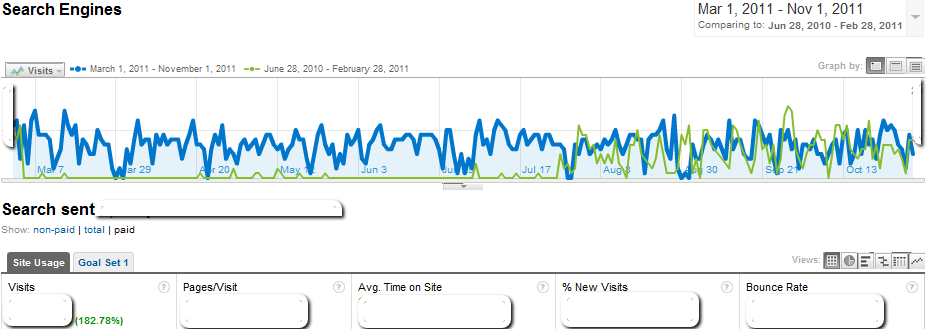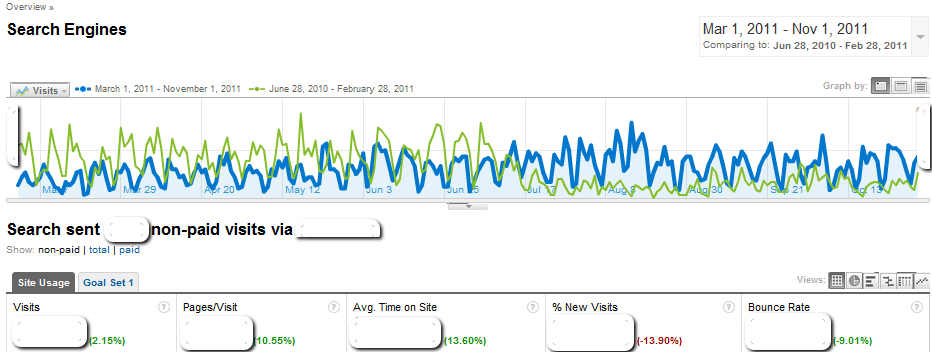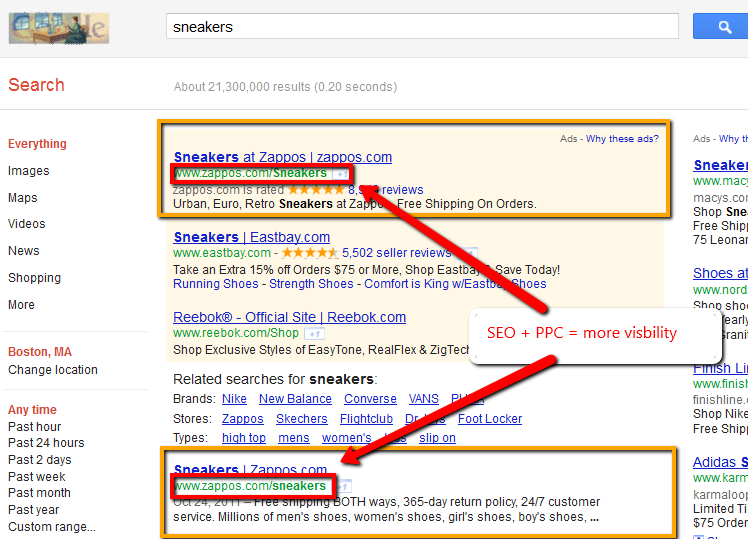When I talk to marketers about search engine optimization and content marketing, it’s always surprising to hear the same response when it comes to their existing PPC campaigns – “It’s going great. We’re seeing leads come in and have gotten results immediately, our online marketing is perfect the way it is.” I hear this while looking at their websites and am baffled. I often see a total of 20-30 landing pages (if that) and maybe a press release here or there. I don’t understand how such small sites – barely visible to search engines – could be considered “perfect.”
I think businesses often have the misconception that investing in PPC or SEO is mutually exclusive – if you’re investing in one why invest in the other? In reality, these are two very different strategies that should work together to maximize online presence and leads.
The real deal with PPC
Let’s look at PPC first: You want to rank for a certain keyword, so you bid for prime search engine result page real estate and pay Google each time someone clicks on one of your paid links. Seems simple enough. However, how much are you paying for each click? Are the people ultimately clicking on the link valuable traffic (i.e. qualified leads?)

From what I have seen and heard from marketers, PPC undoubtedly increases the traffic to your site but is never a 1:1 ratio of traffic to conversion. It’s a great way to boost brand awareness and see quick results, but the minute you stop putting in the money, it’s over. You don’t gain any long-term results from PPC
SEO: In it for the long haul
SEO on the other hand is a more strategic way to lead people (and the right people) to your site consistently. When asked about the online marketing campaigns that have the greatest impact on lead generation, Brafton reported that the majority of marketers say SEO is top for lead gen (cited among 57 percent of B2B marketers and 41 percent of B2C marketers). PPC, on the other hand, was named the top tool for lead gen among 34 percent of B2C marketers and just 25 percent of B2B.
Search engine optimization is a way to catch clicks among discerning searchers – and consumers increasingly understand the difference between “paid” and “organic” listing. Thus, investing in SEO will ultimately increase the amount of relevant traffic coming to your site, and you build positive rankings, keyword referrals and (through content marketing) useful landing pages over time.
Using content marketing to fuel SEO is a long-term strategy, but the results are long-lasting. If you’ve invested in great keyword-dense landing pages or blog posts, those will remain cached in Google – unlike your ads that will disappear as soon as you stop paying.
Notice that I used the term “paying” when referring to PPC and “investing” when referring to SEO … PPC is a cost where SEO is an investment. Think PPC as renting a space, while SEO is buying a home.
When you rent an apartment, you pay a certain amount of money on a periodic basis in return for a roof over your head. Once you cease to pay rent, you will be evicted from the house with nothing to show for all of your previous payments. Similarly, as you pay for PPC, you will see your paid search results show up for specific keywords. Once you choose to stop paying for PPC, you will be kicked off the first page and all the traffic you were generating before from your PPC campaign is now going to your competitors’ pages.
Now, let’s compare SEO to buying a house. When you buy a house, you acquire not only a current shelter but an asset to be used in the future. Buying a house is an investment¸ just like search engine optimization. A rental house might come complete with furniture, where it will take time to acquire the furnishings for your home and odds are that you won’t see immediate SEO results the way you could with PPC.
In fact, it is not atypical that it may take several months before some strong results can begin to be seen. However, after putting that initial investment of time to working on an SEO strategy (or paying off a mortgage and choosing your decorations), the results will be longer lasting and can continue to grow.
SEO and PPC: The ultimate pairing
Before you think that I am a disbeliever in PPC, let me clarify: PPC does work to some extent. Of course it does, otherwise why would people continue to pay for it? However, I think that PPC combined with SEO is the surefire way to create the most effective strategy.
A study conducted by Search Engine Watch suggests that each organic ranking gained can reduce the cost of paid clicks by 9 percent. Moreover, Brafton has reported that half of consumers are more likely to click on a result if the sponsoring brand appears multiple times on a SERP, which means having both a paid and organic presence can increase a business’ chances of winning clicks.
So, to recap, investing in SEO adds multiple benefits to your PPC costs, including:
· Improving the quality and relevance of your landing pages. If you are using content marketing to drive SEO, content writers(L) will help generate better landing pages, and this will increase your Quality Score.
· This, in turn, will lower the cost per click for each of your PPC links.
· Showing up in both the paid search and organic search gives you more visibility and dominance in the first page of the SERPs, and this fosters trust among online consumers (and encourages clicks).
Consider the example of one B2B business that offers sales training: Prior to investing in content marketing, Resolution Systems Inc. didn’t have a strong SEO strategy, and it’s only online marketing investment was PPC. CEO Barrett Riddleberger said with PPC, “We were getting leads from our website, but the system wasn’t as robust as it could have been.”
After seven months of working with professional content writers(L) on search-friendly landing pages and blog posts, the company’s organic traffic levels rose dramatically. The overall quality of organic traffic was also improved, with visitors staying on the site longer, looking at more pages and demonstrating lower bounce rates.
At the same time, Resolution System Inc’s paid traffic (though only amounting to about one-quarter of the organic traffic) rose by 187 percent over the seven-month period before its SEO investment. Clearly, the presence of organic listings and improved quality of its landing pages helped invite clicks among online searchers.
Conclusion
Overall, I believe that it is not a question of choosing SEO over PPC or choosing PPC over SEO. Rather, it is the process of finding a balance between the two to create an effective, ROI-based and – most importantly – enduring strategy. Of course, if you were to ask me which of the two strategies I more strongly advocate, I’ll always go with SEO; a rented house is not always a home. Those in doubt, try investing in content marketing for SEO – in several months I think you will agree with me.


